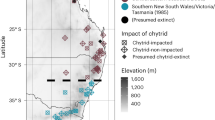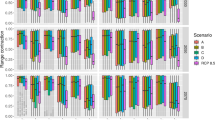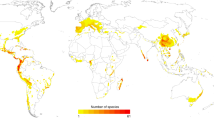Abstract
Arising from: J. A. Pounds et al. Nature 439, 161–167 (2006)10.1038/nature04246; Pounds et al. reply
Is global warming contributing to amphibian declines and extinctions by promoting outbreaks of the chytrid fungus Batrachochytrium dendrobatidis? Analysing patterns from the American tropics, Pounds et al.1 envisage a process in which a single warm year triggers die-offs in a particular area (for instance, 1987 in the case of Monteverde, Costa Rica). However, we show here that populations of two frog species in the Australian tropics experienced increasing developmental instability, which is evidence of stress2,3,4, at least two years before they showed chytrid-related declines. Because the working model of Pounds et al. is incomplete, their test of the climate-linked epidemic hypothesis could be inconclusive.
This is a preview of subscription content, access via your institution
Access options
Subscribe to this journal
Receive 51 print issues and online access
$199.00 per year
only $3.90 per issue
Buy this article
- Purchase on Springer Link
- Instant access to full article PDF
Prices may be subject to local taxes which are calculated during checkout


Similar content being viewed by others
References
Pounds, J. A. et al. Nature 439, 161–167 (2006).
van Dongen, S. J. Evol. Biol. 19, 1727–1743 (2006).
Parris, M. J. & Cornelius, T. O. Ecology 85, 3385–3395 (2004).
Söderman, F., van Dongen, S., Pakkasmaa, S. & Merilä, J. Oecologia 151, 593–604 (2007).
Reading, C. J. Oecologia 151, 125–131 (2007).
Kiesecker, J. M., Blaustein, A. R. & Belden, L. K. Nature 410, 681–684 (2001).
Burgin, S., Schell, C. B. & Briggs, C. Acta Zool. Sinica 51, 344–348 (2005).
Richards, S. J. & Alford, R. A. Aust. J. Zool. 53, 229–236 (2005).
Alford, R. A., Bradfield, K. & Richards, S. in Declines and Disappearances of Australian Frogs (ed. Campbell, A.) 34–43 (Environment Australia, Canberra, 1999).
Alford, R. A. & Richards, S. J. Conserv. Biol. 11, 1026–1029 (1997).
Bosch, J., Carrascal, L. M., Durán, L., Walker, S. & Fisher, M. C. Proc. R. Soc. B 274, 253–260 (2007).
Pounds, J. A., Carnaval, A. C., Puschendorf, R., Haddad, C. F. & Masters, K. L. Science 314, 1541–1542 (2006).
Laurance, W. F., McDonald, K. R. & Speare, R. Conserv. Biol. 10, 406–413 (1996).
Lips, K. R. et al. Proc. Natl Acad. Sci. USA 103, 3165–3170 (2006).
Laurance, W. F. Biol. Conserv. 77, 203–212 (1996).
Author information
Authors and Affiliations
Corresponding author
Ethics declarations
Competing interests
The authors declare no competing financial interests.
Rights and permissions
About this article
Cite this article
Alford, R., Bradfield, K. & Richards, S. Global warming and amphibian losses. Nature 447, E3–E4 (2007). https://doi.org/10.1038/nature05940
Received:
Accepted:
Published:
Issue Date:
DOI: https://doi.org/10.1038/nature05940
This article is cited by
-
Short-lived species move uphill faster under climate change
Oecologia (2022)
-
Biochar from biomass waste as a renewable carbon material for climate change mitigation in reducing greenhouse gas emissions—a review
Biomass Conversion and Biorefinery (2021)
-
Effects of emerging infectious diseases on host population genetics: a review
Conservation Genetics (2017)
-
Understanding the dynamics of physiological impacts of environmental stressors on Australian marsupials, focus on the koala (Phascolarctos cinereus)
BMC Zoology (2016)
-
Global stressors and the global decline of amphibians: tipping the stress immunocompetency axis
Ecological Research (2011)
Comments
By submitting a comment you agree to abide by our Terms and Community Guidelines. If you find something abusive or that does not comply with our terms or guidelines please flag it as inappropriate.



